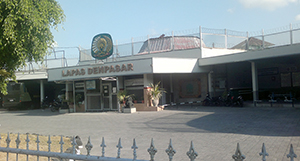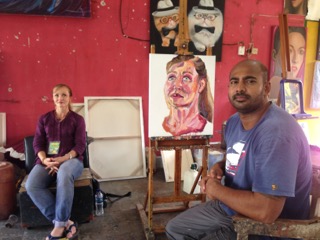By Jeff Brumley
Australia and much of the rest of Asia are caught up in an international media and political storm swirling around the so-called Bali Nine as two of the group of drug smugglers are scheduled for execution in Indonesia by the end of the month.
But working quietly with the Australian prisoners in Bali is Tina Bailey, who has served with her husband, Jonathan, as Cooperative Baptist Fellowship field personnel in Indonesia since 1996. They share the title of coordinator of arts and engagement, and focus their efforts on rebuilding community through art.
It was Bailey’s reputation as a dancer and a painter that earned her an invitation three years ago from Myuran Sukumaran, one of the two scheduled for execution. Sukumaran sought Bailey’s assistance with an arts program he had initiated in the prison, she told Baptist News Global through email.
 “At that time I was primarily helping with painting, and providing a caring and listening ear to the inmates,” she said. “After some time he also asked if I could help by teaching basic drawing skills, then after a while we also started a dance group.”
“At that time I was primarily helping with painting, and providing a caring and listening ear to the inmates,” she said. “After some time he also asked if I could help by teaching basic drawing skills, then after a while we also started a dance group.”
Slowly, Bailey came to meet the other members of the Bali Nine.
Many around the world have come to know the men, too, since their arrests and subsequent convictions for attempting to smuggle $4 million in heroin from Indonesia to Australia. Seven of them received sentences ranging from 20 years to life in prison.
But Sukumaran and Andrew Chan were considered the leaders and were sentenced to death by firing squad. The recent announcement that those sentences were to be carried out this month has created a media and diplomatic uproar, with the men’s families pleading for their lives.
The feelings are the same inside Kerobokan Prison, Bailey said.
“We are of course talking about the shock of news that Myuran and Andrew have been put on the execution list this month,” she said. “There is so much of a feeling of disbelief and injustice.”
Arguments for leniency
Arguments for leniency include the exemplary lives the two men have led during their incarceration. Family members cited efforts by Sukumaran and Chan to help prisoners quit drugs while adopting healthy life skills, according to media reports. Chan is studying to become a pastor.
“He is doing everything he can to help people inside and no one is listening to us, it’s not fair,” Brintha Sukumaran said of her brother in a story published Feb. 6 by the Guardian newspaper. “We don’t have much time and he is scared, I can see it in his eyes.”
The man’s mother, Raji Sukumaran, told reporters her son sold two of his paintings to finance a woman’s operation for a tumor in her uterus.
“They have been rehabilitated, they have been doing a lot of things, they are good children, please don’t kill him,” she said.
Bailey said she has seen that giving side of Sukumaran, too.
“My first conversation with [Sukumaran] was about the needs of the other inmates and how he wanted them to develop more skill and how he wanted women to have someone they could trust and talk to, as well,” she said.
Bailey confirmed that other inmates are equally distraught that Chan and Sukumaran are in the next group of prisoners to face the firing squad.
“For them, Myuran and Andrew are a symbol of hope and goodness and the possibility of” turning one’s life around. “They are examples of people they want to follow, and for that to be put in jeopardy is very, very disturbing for all of them.”
Coping with and hoping for a future
While Bailey’s role in the prison, which she visits weekly, has been to help with art and dance courses, she’s also been able to build relationships with many inmates, including some of the Bali Nine and also others.
“The conversations I have with all of them are very natural and open about life and how they are coping and hoping for their futures,” she said.
Besides Sukumaran, another of the nine Bailey has come to know very well is Si Yi Chen, who is serving a 20-year sentence. Chen is a silver maker who runs a jewelry making workshop in the prison.
She noted that the Bali prison is different from its American counterparts.

“In the workshop area, men and women are there painting, learning computer graphic design, silver, gardening, surfboard building and dance,” Bailey said.
It is a very creative, positive space that’s a result of the efforts of Chen and Sukumaran, she said.
“Over the time I have known them, I have seen two young men find hope and healing through what they are doing in making art and sharing their skills with the other inmates,” Bailey said. “They are leaders with a beautiful, positive influence.”
That makes Sukumaran’s imminent death sentence all the more unbearable.
“The current situation is one of the hardest things I have ever experienced,” said Bailey, who added that she is also concerned how the executions will effect those who have come to know Sukumaran and Chan.
“I … see the impact of their life on so many others, both with inmates and the guards, and I am concerned about the long-term impact on all of them.”
